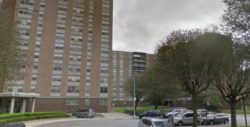
Spring Creek Towers. Image credit: Google Maps.
Rental Assistance program sought to establish lease renewal and limit rent increases based on rent stabilization regulations. In 2015, prospective tenants Regina Alston and Sandra Vaughn-Cooke inquired about apartment vacancies at Spring Creek Towers. Starrett City, Inc. owns Spring Creek Towers, located in the East New York neighborhood in Brooklyn. Spring Creek Towers is an apartment complex with 5,881 apartments. Alston and Vaughn-Cooke both had Living in Communities (LINC) rental vouchers. Starrett City, Inc. did not accept the LINC rent vouchers.
In 2014, the Department of Homeless Services created the Living in Communities (LINC) Rental Assistance Program to provide rent vouchers to families and persons in shelters. The LINC rental assistance program requires landlords that accept the vouchers to enter into lease riders requiring the landlords to renew leases automatically for the second year of the lease and limit rent increases to rental increases of rent-stabilized apartments.
Alston, Vaughn-Cooke, and the Fair Housing Justice Center sued Starrett City for source of income discrimination. The prospective tenants alleged that Starrett City discriminated against the tenants because the tenants had LINC rent vouchers, a lawful source of income. The tenants filed to force Starrett City to process and respond to the tenants’ rental applications and to require Starrett City to leave at least one apartment vacant while Starrett City processed the tenants’ applications.
Starrett City argued that by forcing landlords to accept limited rent increases, New York City was applying rent stabilization regulations to non-rent stabilized units and by extension putting the non-rent stabilized units under the City’s control. Under state law, the New York City Council could not pass any laws or regulations that would impose New York City’s control over non-rent stabilized or controlled units.
New York County Supreme Court Judge Shlomo S. Hagler ruled that the mandatory rider did not convert a non-rent-stabilized apartment into a rent-stabilized apartment because rent-stabilized apartments have other requirements. Starrett City appealed.
The First Department reversed the lower court’s decision. The court ruled that the LINC rental assistance program’s mandatory lease renewal at rental rates based on rent regulatory programs improperly expands New York City regulatory power over housing units that are not currently under New York City’s control.
The court also found the City-created LINC mandatory renewal provisions violated the law by forcing landlords to abide by rent regulations for non-rent stabilized units. The City was extending its control over the non-rent stabilized units without prior approval, which was the kind of action the state law was designed to prevent. While the court stated that on its own the LINC program was legal, the mandatory lease renewal provision violated state law.
CIT) Alston v. Starrett City, Inc., 161 A.D.3d 37 (1st Dep’t April 5, 2018) (Attorneys: Robert Desir, Judith Goldiner, Joshua Goldstein, Beth Hofmeister, Jason I. Kirschner, Joaquin M. C de Baca, Mark G. Hanchet, Michael E. Rayfield, Noah Liben and Kevin C. Kelly for Alston, Vaughn-Cooke and Fair Housing Justice Center; Niles C. Welikson for Starrett City.)
By: Veronica Rose (Veronica is the CityLaw Fellow and a New York Law School Graduate, Class of 2018.)

